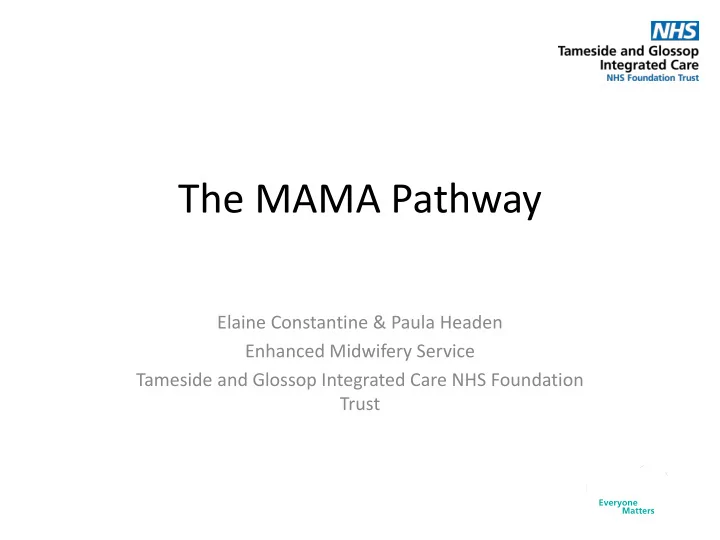

The MAMA Pathway Elaine Constantine & Paula Headen Enhanced Midwifery Service Tameside and Glossop Integrated Care NHS Foundation Trust
Maternity No Alcohol = No Risk Alcohol Management Algorithm
Why Is MAMA Needed? • Tameside is an area with above average rates of hospital admission due to alcohol harm • Women receiving inconsistent advice around alcohol consumption in pregnancy • False messages around alcohol (Guinness is good for you/full of iron) • Signposting required to services for support with abstinence • Children born with FASD require timely referral to appropriate services (speech/language therapy etc.) to achieve better outcomes
Why should we worry ? What is FASD ? FASD is an umbrella term that encompasses a wide range of medical conditions that are attributed to alcohol use in pregnancy. Foetal alcohol syndrome (FAS) is the most severe of these. growth failure, craniofacial abnormalities and neuro-developmental delay. Socially people who suffer with FASD are at a greater risk of: living below the poverty line, being unemployed and having a criminal record. Higher rate of depression and suicide
No alcohol = No Risk ! MAY RESULT IN
Facts About FASDs • FASDs are the leading known cause of preventable Brain Damage. • FASDs affect an estimated 40,000 newborns each year. • FASDs are more common than autism. • The effects of FASDs last a lifetime. • People with an FASD can grow, improve, and function well in life with proper support. • FASDs are 100% preventable.
FASDs • No amount of alcohol consumption during pregnancy is proven to be safe. • FASDs are not caused by the biological father’s alcohol use. • FASDs are not caused intentionally by the mother: Many women simply may not know when they are first pregnant or may not be aware of the harm that alcohol consumption during pregnancy can cause.
Facts About Alcohol Use Amongst Pregnant Women Research has demonstrated that : • Nearly 12 percent of pregnant women report using alcohol in the past month. • Nearly 16 percent of pregnant women aged 15 to 17 used alcohol in the past month, and they consumed an average of 24 drinks in that month (i.e., they drank on an average of 6 days during the past month and had an average of about four drinks on the days that they drank).
Cause of FASDs • The sole cause of FASDs is the foetus being exposed to alcohol during the pregnancy. • Alcohol is a teratogen : A drug or other substance capable of interfering with the development of a fetus, causing birth defects. Of all the substances of abuse (including cocaine, heroin, and marijuana), alcohol produces by far the most serious neurobehavioral effects in the fetus.” — IOM Report to Congress, 1996
Cause of FASD’s • All alcoholic beverages are harmful. • Binge drinking is especially harmful.* • While it’s true that not every woman who drinks during pregnancy will have a child with an FASD, that does not mean that these disorders are rare or random. • Any time a pregnant woman consumes alcohol, it becomes possible that her baby will have an FASD. * Binge = 4 or more standard drinks on one occasion for women
Typical Difficulties for a person with an FASD • Tend not to learn from mistakes or natural consequences • Frequently do not respond to reward systems (points, levels, stickers, etc.) • Difficulties with information processing • Social Isolation • Often grow up living in multiple homes and experience multiple losses • Have difficulty entertaining themselves • Naïve, gullible (e.g., may walk off with a stranger) • Struggle with abstract concepts (e.g., time, space, money, etc.) • Poor Self esteem and personal difficulties • Problems with balance and motor coordination • Sensory Difficulties
FASD Demonstration Doll • Smaller head; • Flat mid-face; • Short nose; • Think upper lip; • Indistinct philtrum; • Eyes that are somewhat almond-shaped.
MAMA Pathway • ALL women are screened at booking – repeated at 16 weeks • Early identification and intervention is key – damage limitation • Pathway offers postnatal support to reduce the risk of parents returning to harmful drinking habits after birth which could impact on parenting • Information regarding maternal drinking habits migrated into neonatal notes following birth • Information can assist in diagnosis of FASD later in life – currently a challenge due to lack of information during pregnancy • Initial audit of pathway after 6 months revealed that 58% of women booking in pregnancy were identified as displaying harmful drinking habits • ALL women, regardless of screening outcome receive advice leaflet reinforcing current guidance around No Alcohol = No Risk message
TWEAK Short, 5 question screening test to identify drinking in pregnancy: Tolerance Worry Eye-opener Amnesia K(cut down)
Questionaire
Algorithm
Thank You ANY QUESTIONS?
Recommend
More recommend